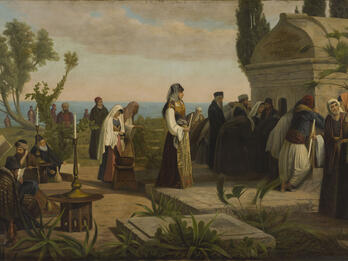Menorat zahav (Golden Menorah)
Elimelech of Lizhensk
Zusya of Annopol (Hanipoli)
1902
When Rabbi Zusya went to suffer the exile in Germany, he came to a city of Reform Jews. When they saw his ways, they mocked him and thought he was crazy. When he came into the synagogue, some of them poked fun at him, and when the children saw their parents ridiculing him, they thought he was crazy and began to pull at him, and tug at his belt…

Related Guide
European Rabbinic Scholarship
Despite the challenges of the early modern period, rabbinic scholarship flourished in Central and Eastern Europe in the latter half of the eighteenth century and the first half of the nineteenth century.
Creator Bio
Elimelech of Lizhensk
Born in Tykocin, Poland, Rabbi Elimelech of Lizhensk was the founder of Hasidism in Poland and Galicia. He was the foremost disciple of Dov Ber, the Magid of Mezritsh, whom he succeeded after the latter’s death in 1772. The brother of Meshulam Zusya of Annopol, he settled in the Galician town of Lizhensk, where he gathered his own group of disciples, including Jacob Joseph Horowitz (the “Seer of Lublin”) and Abraham Joshua Heshel of Apt. Elimelech’s magnum opus, No‘am Elimelekh (1788), emphasizes the roles of a tsadik, or Hasidic rebbe, including praying for the material as well as spiritual welfare of his followers.
Creator Bio
Zusya of Annopol (Hanipoli)
Meshulam Zusya of Annopol was born in Poland and was the brother of Elimelech of Lizhensk. Zusya was a follower of Dov Ber, the Magid of Mezritsh, who also influenced Elimelech to become a Hasid. After Dov Ber’s death in 1772, Zusya moved to Annopol, where he was instrumental in establishing Hasidism in Galicia. Zusya was one of the best-known heroes of Hasidic folk tales, portrayed as a humble and kind man who attained merit on account of his innocence and personal righteousness.


